Misfits, The (1961)
“You have the gift for life, Roslyn.”
|
Synopsis: |
|
Genres, Themes, Actors, and Directors:
Response to Peary’s Review: Despite all those caveats, Peary points out how “amazing” it is “what a wonderful performance [Monroe] gives”, given the fact that she was “having tremendous psychological problems during the filming”. He writes that she’s “beautiful, angelic, vulnerable, assertive, wise beyond her education, unhappy, [and] the sufferer for all creatures (man or animal) that hurt”, and he states that he’d “like to think that this role comes closest to the real Marilyn Monroe”. Monroe’s performance is truly noteworthy: it’s literally impossible to keep your eyes off of her, and we instantly understand why all the other characters want to be near her. Ritter, meanwhile, is wonderfully droll in one of her many stand-out supporting performances: and all three men do fine ensemble work together. While the overly dense storyline may not pack as much of a punch as it could, there’s no denying that this remains an impactful, affecting film on many levels, and is worth viewing by all film fanatics at least once. Note: Check out this recent NY Times article for an update on the status of wild horses across the United States. Redeeming Qualities and Moments: Must See? Categories
Links: |
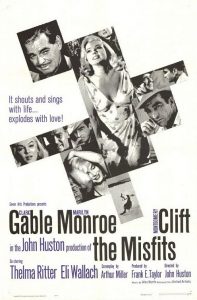
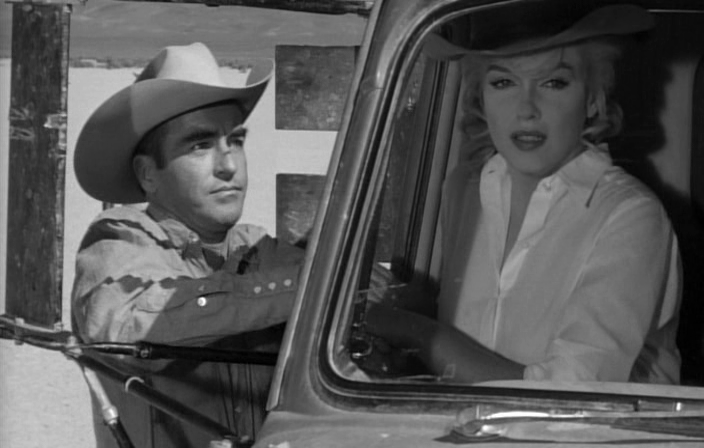
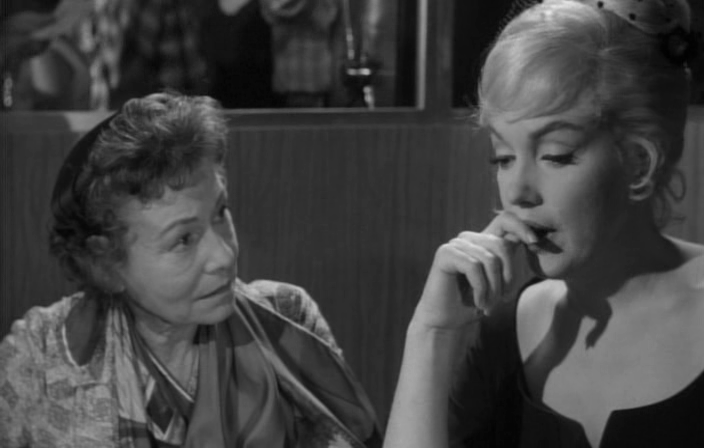
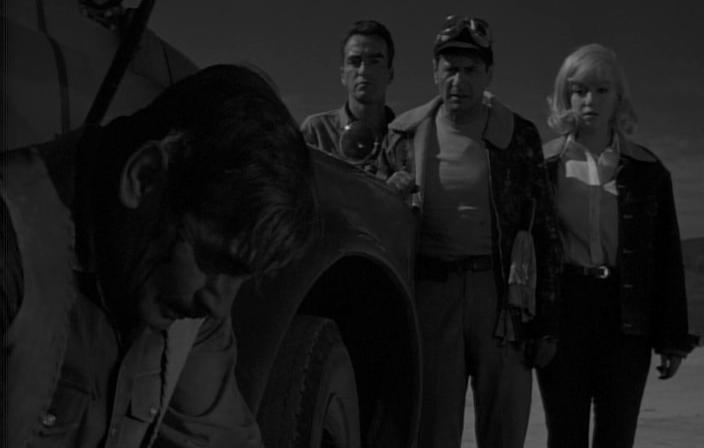
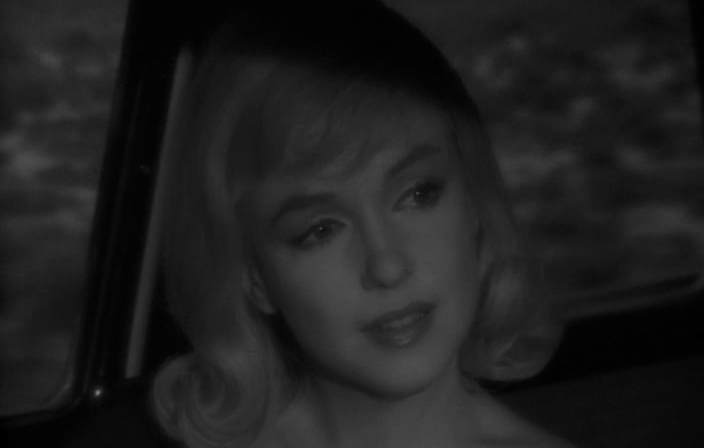

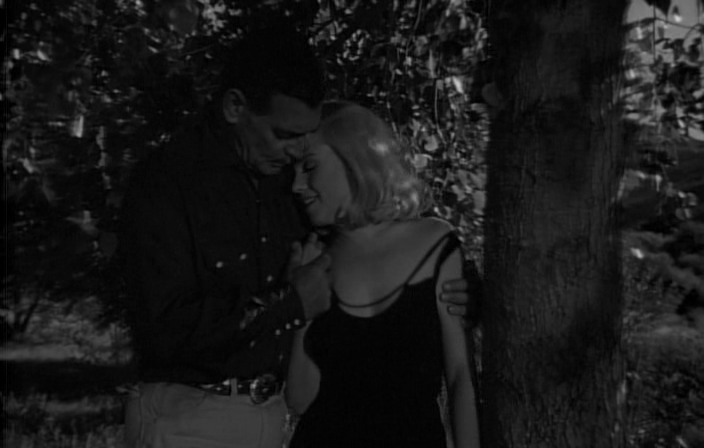
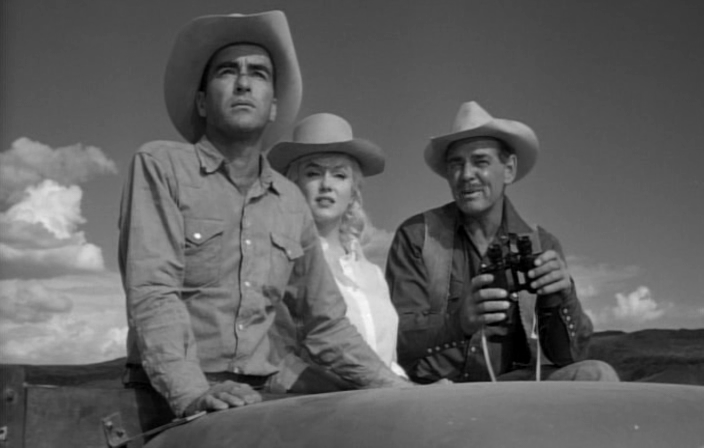
One thought on “Misfits, The (1961)”
A once-must, for its one-of-a-kind place in film history.
In the 2001 PBS ‘making of’ doc about ‘The Misfits’ (which I’ll link below), Huston’s son Tony says, “It’s really a miracle it’s as good as it is, considering the difficulties that he had with her – and she was just having with life.”
‘She’, of course, is Marilyn – and, all along, this was designed by Miller as her movie (even though Miller was not in the habit of writing roles specifically for actors). Her character’s name also ends in ‘~lyn’ and it begins with ‘rose’, making it clear this was Miller’s intended ‘valentine’ to his wife.
So much for the best of intentions – their marriage fell apart as filming progressed. And that’s the (ironically-titled) misfit film that we see.
I used to think this film was on the turgid side. But, seeing it again, I wouldn’t exactly describe it that way. I hadn’t seen it in a long time – and it now seems to me that the film is a bit like Welles’ ‘The Lady from Shanghai’, in that it gets better if you get older. Both films are world-weary: they’re about disappointment and disillusionment, about what it means to just try to get through life, realizing what a struggle it can be to communicate well with others, find people you can relate to, and gain enough understanding of who you are and what your purpose is. …And what your place is. Reno, as a setting, comes off as a place made for people who don’t know where else to go (and several of the characters are from elsewhere).
While I agree that the film is (slightly) over-written (or, rather, I would say it’s sometimes awkwardly written), I hardly think it lacks insight. It’s an extremely compassionate script. It’s not just the mustangs who, as Gable says, are “misfits”; all of life is a misfit experience – a non-stop longing for how to fit in. (~which sort of makes it the quintessential Huston film.)
One of the most unusual aspects here is that we get four top-notch performances. Reportedly, Monroe hated her performance but Gable thought his was his best work ever on film. It seems Monroe had no objectivity about what she delivered – but it’s not hard to understand her feeling on some level. It’s not so much that her role is under-written but her enigmatic character is only sporadically forthcoming. Roslyn is somewhat uncomfortable being adored for her looks, so she’s tentative (even if she’s not above being direct and blunt if the situation calls for it). It was not an easy role to play, mainly because at times she appears to be little more than a militant vegetarian.
It may be thought that Gable’s best moment is when he’s being dragged by a stallion but I think it comes much earlier, when he’s stoned-drunk and standing on a truck, calling out for his children. That is a very brave sequence for someone of Gable’s stature.
I happen to think this is one of Clift’s best performances. I’m not a major fan of his work (as I’ve said elsewhere) because I’ve always felt he was hard to cast in roles (for some reason). But when a role fits him like a glove, I do think he shines (as he does here). Watching this time, I laughed out loud once: when he’s in the phone booth, talking with his mother. He is about to hang up but he asks his mother to say hello for him to various people but he forgets to mention his mother’s new husband, which doesn’t seem to please her. Clift responds, “I didn’t marry him, you did – say hello to him.”
Wallach is in solid form. His character is carnal and self-serving – in some ways similar to Wallach’s role in ‘Baby Doll’. (I have no doubt that Miller and Tennessee Williams kept track of each other’s work.)
If I don’t mention Thelma Ritter as being among the stand-out performances, that’s not her fault. What she does is wonderful and in sturdy Ritter form – it’s just that she leaves the film. ~and I miss her when she goes. Personally, I’d have loved a scene with her, Monroe and Clift together.
During this viewing, I was probably more engaged than I’ve ever been previously. If the film doesn’t work completely (and we sometimes get that from its changing mood), I still don’t think it has a whole lot to apologize for. It’s an ambitious film about what it means to be human. That’s enough for me to applaud it.
Link to ‘making of’ doc: https://www.youtube.com/watch?v=ESzU5ZRUpZ8